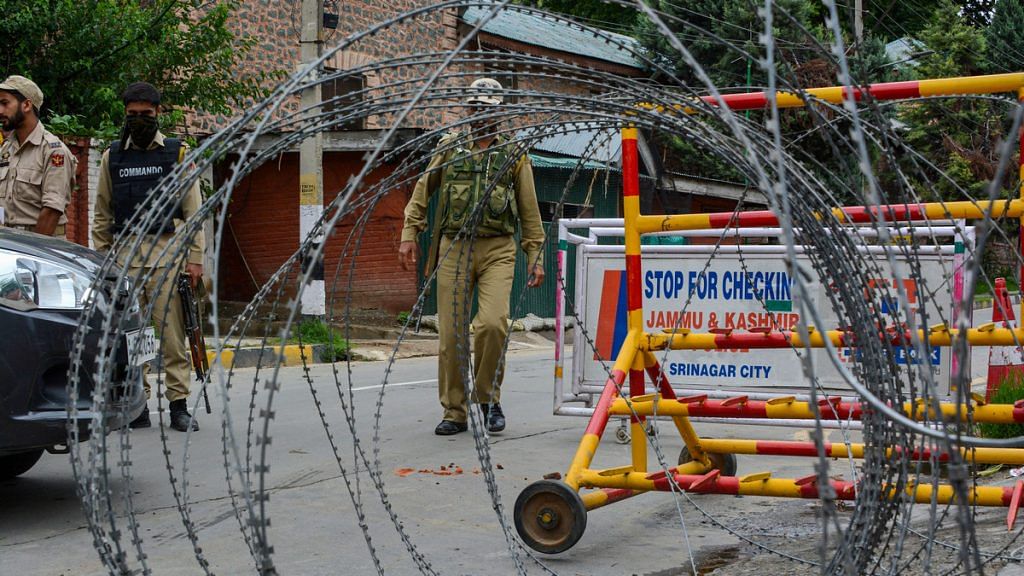New Delhi: Any government official in Jammu & Kashmir (J&K), including senior IAS and IPS officers, can now be dismissed from service without an inquiry if found to be engaged in “anti-national” activity, ThePrint has learnt.
According to sources in the J&K government, a committee has been formed under Chief Secretary B.V.R. Subrahmanyam to examine and recommend action, including dismissal from service, with regard to officers “working against the ‘integrity and security’” of India.
The committee also comprises the J&K home secretary, the director general of police, administrative secretaries of the general administration and law & justice departments, and additional director general of police (CID), the sources said.
The panel was set up after an order was issued by the J&K government last week. The order, a copy of which was accessed by ThePrint, invokes Article 311(2)(c) of the Constitution of India, which allows for the “dismissal, removal or reduction in rank of persons employed in civil capacities under the Union or a State” on certain predetermined grounds.
The Article was not applicable to Jammu & Kashmir earlier, when it enjoyed the special status granted to it under Article 370 of the Constitution. The erstwhile state was stripped of the special status last year. Government officials could be removed or dismissed from service earlier, but not without an inquiry.
ThePrint approached J&K government spokesperson Rohit Kansal via calls and text messages for a comment, but he did not respond.
An IPS officer based in Jammu & Kashmir said “anti-national activities” could include actions perceived as “endorsing or promoting militancy”.
Also Read: Grand media tour through J&K could mark first anniversary of Article 370 being scrapped
Background check of officials on
Sources in the UT administration told ThePrint that punishment for the erring officials will be “differential”, and depend on the degree of their “offence”.
A source said a thorough background check of government officials will be undertaken and action could be initiated if found to have been involved in “anti-national activities” even in the past. The action will range from suspension, fines, termination of services and even legal proceedings in extreme cases, said the source.
A second source in the administration said the process of this background check has already started, and the UT might see termination of the services of several employees in the next few months. “The list includes those who have or are currently engaged in anti-national or separatist activities.”
The second source added that the officials whose background checks are on include those working in different government departments and also the J&K Police. “The officials are being checked for spreading anti-India feelings either by their spoken word or through communications with anti-national elements. The police force is also being checked for rogue elements who might have been in connivance with militant groups at local level.”
Also Read: J&K plans low-key 5 August anniversary celebration, Kashmir BJP to mark day with India flags
Article 311(2)(c) of the Constitution
Article 311(2)(c) of the Constitution states that no government official can be dismissed or removed from service or reduced in rank in the absence of an inquiry, except in circumstances “where the President or the Governor, as the case may be, is satisfied that in the interest of the security of the State, it is not expedient to hold such inquiry”.
The order issued last week said, “Sanction is hereby accorded to the constitution of a committee for scrutinising and recommending cases under Article 311(2)(c) of the Constitution of India”.
“The cases shall be referred by the administrative departments or police organisation to the home department,” it said. “On receipt of such a report, the home department shall examine the case and upon satisfaction that the case meets the requirement of Article 311(2)(c), it shall place the case before the committee,” it added.
The order requires all recommendations to be “supported by relevant records which may include a copy of the interrogation report and other collateral evidence to justify dispensing with the holding of an inquiry in the interest of security of the state”.
It added, “The home department shall place each case along with the recommendations of ADG (additional director general of police), CID, J&K before the committee, and recommendations of the committee shall be processed by the administrative secretary, home department for orders of the competent authority in terms of Article 311(2)(c) of the Constitution of India.”
Come Wednesday, Jammu & Kashmir will complete a year since the revocation of Articles 370 and 35A, which gave the erstwhile state certain privileges with respect to its administration, among other things.
With inputs from Azaan Javaid
Also Read: Merger of J&K IAS, IPS cadre into AGMUT ‘on hold’ as officers say it’s recipe for confusion
